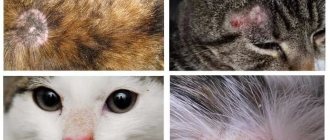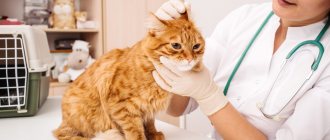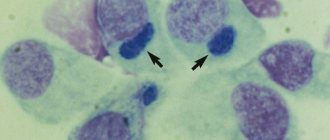Is there cat flu?
Many cat owners wonder what cat flu is. This virus is not transmitted from humans; animals most often become infected from their relatives. Therefore, the disease is often transmitted between cats living in shelters. There are also other risk groups:
- cats without vaccines;
- kittens (due to weak immunity);
- older cats;
- cats whose immunity has been suppressed due to cancer or taking medications that affect the immune system.
The cause of influenza in cats is infection with the rhinotracheitis virus or calicivirus.
How does infection occur?
Can a kitten get infected with ARVI from a person? Cat flu most often occurs in cats that live outside, often walk there, or are in large numbers in one room. It is worth noting that kittens, as well as older cats, more often suffer from the disease, the same applies to pets with chronic pathologies and weakened immunity.
A cat can become infected through contact with other individuals through airborne droplets. As a rule, this happens when animals play together, eat or drink from the same container. The virus practically does not live in the air, deteriorating quite quickly, but there is a possibility that it can linger on toys, bedding, and combs.
Symptoms and treatment
The disease can be identified in a pet by a number of characteristic signs:
- heat;
- sneezing and coughing;
- profuse salivation and tear production;
- nasal discharge;
- lack of appetite;
- lethargy, weakness;
- in some cases - the formation of ulcers in the mouth.
If the owner observes at least one obvious symptom in his cat, it is necessary to go for an examination to a veterinarian - the doctor, based on the complaints, will prescribe tests and will soon be able to make a diagnosis.
If cat flu is confirmed, treatment should also be prescribed exclusively by a specialist.
Important!
Cat flu is significantly different from human flu, and any attempts to cure the animal on your own can not only delay recovery, but also aggravate the situation.
Depending on the pathogen, the flu in a cat can occur in different ways. When the disease was caused by a herpes virus infection, the clinical signs are more pronounced; the cat has conjunctivitis.
If the causative agent is a calicivirus infection, the disease is milder. However, small kittens with severe influenza may develop pneumonia, as well as passing arthritis.
Diagnostics
Influenza in cats is an upper respiratory tract disease.
The doctor, analyzing the signs, makes a conclusion about the diagnosis, but sometimes may prescribe additional tests. To conduct them, you need to collect samples of discharge from the eyes, as well as a sample of saliva.
The genes of the virus can also be detected at the molecular level using a special PCR test.
Treatment
The doctor prescribes medications aimed at fighting the infection and alleviating symptoms. The drugs must be given to the animal in the prescribed quantity for the period specified by the doctor. These factors may vary depending on the severity of the disease and severe symptoms, as well as the age of the cat.
At home
Any owner can treat their cat at home, having previously purchased all the medications necessary for treatment. Most often, doctors prescribe antibiotics and antiviral drugs.
- Treatment with medications. The pet needs antibiotics to fight infection (for example, Clamoxil), antiviral drugs and agents whose action is aimed at improving intestinal microflora.
- To combat loss of appetite, you can give your cat high-quality flavored wet food. In addition, we must not forget to constantly change the water in the drinking bowl, monitoring its freshness and quantity.
- If your cat has breathing problems, inhalations will be required to loosen the blockages in the respiratory tract.
- Injections of interferon may be prescribed, which will strengthen the body's resistance to infection.
- For eye diseases, special ointments or drops are prescribed - cidofovir, trifluridine, etc.
Caring for a sick cat is very important: if the animal’s condition worsens, hospitalization may be required. For example, if you have anorexia, you will need to feed your cat through a tube, and if your pet refuses water, you will need intravenous fluids. Such measures will speed up recovery.
If the doctor notices that the animal is in pain, he will prescribe analgesics. In other cases, additional medications may be needed to eliminate unpleasant symptoms and alleviate the cat’s condition.
Reference!
Some medications can be dissolved in water or mixed with food, so as not to torment the animal by swallowing bitter tablets.
Can you catch the flu from pets?
- Don't be afraid, I'm not contagious!
Our cat has a cold and has been sneezing for several days. Can you get the flu from your pets? The Kazanovsky family. Moscow.
Sergey GARUSOV, infectious disease specialist, doctor of the highest category:
- No. Viral infections like influenza occur in both cats and dogs. They manifest themselves in the same way as in humans: fever, cough, runny nose, and are transmitted by airborne droplets from animal to animal. But the human body is immune to them. This does not mean that you can kiss your favorite kitty. You won’t catch the flu from it, but you can easily get conjunctivitis (inflammation of the cornea of the eye).
Before removing papillomas, get tested!
I am 45 years old. Recently I began to notice that unpleasant growths appeared on my eyelids and neck, similar to elongated moles. What are they and can they be removed? Tamara Ivanovna. Tver.
Nadezhda CHERVINSKAYA, dermatocosmetologist:
- Most likely, we are talking about papillomas. This viral disease (human papillomavirus infection) has more than 100 species. Most of these growths are benign tumors and are easily removed by electrocoagulation (cauterization using safe electrical discharges). But there are several types that, if unfavorable, including removal, can turn malignant. So be sure to go to a dermatologist and get tested. Previously, only a biopsy was used to diagnose human papillomavirus infection (when a piece of the growth is cut off and examined). Now doctors advise taking a blood test from a vein for PCR (polymerase chain reaction).
What complications should you expect with the flu?
Flu outbreaks have already begun everywhere. They say that a sore throat causes complications on the heart, and what organs can the flu affect? Svetlana Egorova. Ivanovo.
Yuri GENDON, influenza specialist, professor:
— Flu is a viral disease, and with a viral attack, general immunity decreases. And, as a result, all chronic diseases worsen. In addition, a weakened body easily picks up new diseases. After the flu, especially if you have not received proper treatment, problems with the cardiovascular system may arise: myocarditis, pericarditis, exacerbation of hypertension and angina pectoris. You need to pay attention to pain in the heart, arrhythmia, interruptions, shortness of breath that occurs some time after the flu.
From the genitourinary system after the flu the following are possible: cystitis, pyelonephritis, in women - inflammation of the appendages, in men - orchitis (inflammation of the testicles). With the flu, diuresis (urine output) decreases. Therefore, it is necessary to drink plenty of fluids to quickly remove toxins.
What can a prolonged runny nose lead to?
Last fall I caught a bad cold, and for several months now I have been suffering from a runny nose and my nose is constantly stuffy. At the same time, the temperature is normal and there are no signs of a cold... Igor. Moscow.
Anatoly SMIRNITSKY, otolaryngologist:
— Chronic runny nose (rhinitis) has become another disease of the century - it affects approximately a quarter of the population. And all because they developed a banal runny nose. If a person constantly breathes through the mouth, oxygen metabolism is disrupted, ventilation of the lungs worsens, and oxygen starvation of the blood occurs.
In mild form, this manifests itself as increased fatigue, headaches, and in the worst case, early hypertension and angina pectoris with cardiac asthma.
So if the “leaking” from the nose is not relieved with drops, you wake up with a stuffy nose, you notice that only one nostril is always breathing, there is pain in the eye sockets, above the bridge of the nose - do not put off visiting an ENT doctor.
I highly recommend that, in addition to anti-inflammatory therapy and medicinal rinses, you undergo a good course of physiotherapy to consolidate the effect of treatment and restore the damaged mucous membrane of the nasopharynx.
Is it necessary to go to a veterinary clinic?
Since today there are a huge number of infectious diseases of pets with similar symptoms.
Therefore, under no circumstances should you begin treatment without a visit to the veterinary clinic. The cat should be examined by a specialist who, if necessary, will prescribe additional tests and be able to make a correct diagnosis.
Treatment is also always prescribed depending on many factors, especially the stage of development of the disease. The cat's owner is not able to assess the problem from a medical point of view, and even if the medications are chosen correctly, a specific dosage of all medications will be required for them to be effective.
Diagnosis of the disease
If flu symptoms appear, you should contact a veterinary clinic.
The doctor performs a full examination and prescribes diagnostic procedures:
general blood analysis;- Analysis of urine;
- examination of secretions from the oral cavity and eyes for the presence of the virus using PCR;
- X-ray of the animal's chest.
Based on the examination results, the veterinarian chooses treatment tactics. Flu in cats is significantly different from human flu, so it is forbidden to choose tablets for your animal yourself .
Is cat flu dangerous for humans?
Some cat owners are concerned about whether the virus can be transmitted to humans. There is no need to worry about such an infection: this disease is transmitted only between animals and does not pose a danger to humans.
Attention!
There is no need to be afraid of getting infected from a cat, especially since a weakened, sick pet on days like these needs care and attention more than ever.
Give your cat more time and be sure to provide her with the necessary care: the animal will definitely be grateful to you, even if you give an injection or pills.
Prevention
To prevent cat flu from occurring in your pet, you need to know the basic rules of protection.
- Vaccination. It is carried out in a veterinary clinic and significantly reduces the likelihood of infection, but does not reduce it to zero. Veterinarians recommend such vaccinations for all cats, especially if there are several cats in the family. And, even if vaccination does not guarantee 100% protection against infection, it will significantly reduce symptoms and simplify the course of the disease.
- Control over animal hygiene. Make sure that the bowls your cat eats from are always clean.
- The food must be of high quality and ensure that the animal’s body receives all the necessary vitamins.
- If one of the pets is sick, it should be isolated from the others for the duration of treatment, since the flu is transmitted by contact. Also, pets should not share the same tray, food bowls, toys, brushes, bedding - this will increase the likelihood of influenza transmission.
Important!
It is better to vaccinate your cat once than to constantly worry about the animal getting sick.
Symptoms
Cat flu does not show obvious signs of development immediately; it should take about ten days. But there are cases when manifestations develop literally on the second day after the virus enters the animal’s body.
We recommend reading: Death from influenza
Symptoms of the disease:
- conjunctivitis;
- ulcers on the organs of vision;
- sneezing, discharge from the eyes;
- crusts of secretion that dry out before our eyes;
- nasal congestion;
- profuse nasal discharge (chronic rhinitis), in advanced cases - purulent;
- loss of smell and appetite;
- copious flow of saliva;
- the appearance of ulcers on the mucous membranes of the lips, mouth, and nose;
- increased body temperature;
- weakness.
When such signs appear, it is important to promptly diagnose the cat’s condition. So as not to miss the moment to start drug therapy. Otherwise, the likelihood of developing dangerous complications increases, one of which may be pneumonia, which can completely deplete and dehydrate the pet’s body. In this case, death is most likely.
To make a diagnosis, it is not enough to simply visit a veterinarian; sometimes additional examinations are necessary.
Can a cat get infected from a person? This probability is small unless a person carries traces of the virus on himself and his clothes left by another animal.











